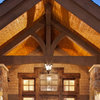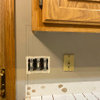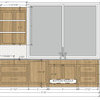'Bonding' vs 'Grounding'?
pelican
15 years ago
Related Stories

HOUZZ TOURSHouzz Tour: 'James Bond' Tree House in Greece
State-of-the-art gadgets and game consoles make this Athens tree house the ultimate tween play area
Full Story
REMODELING GUIDESStyle Update: Tile Gets in Line
Install Your Tile in a 'Stacked Bond' Grid for an Clean, Modern Look
Full Story
LIFE12 Steps to a Happy Teen Bedroom Makeover
Let teen design spirit shine while enjoying bonding time, with these mutually agreeable makeover ideas that don't compromise on style
Full Story
LIFEAnatomy of a Family-Size Mess
Study your home’s dumping grounds to figure out what organizational systems will work — then let yourself experiment
Full Story
LIFE13 Ways to Keep the Peace With Roommates
A few ground rules will help you sidestep conflicts over dirty dishes, laundry, decorating, groceries and more
Full Story
CONCRETEConcrete Block Style
Industrial flair: See why concrete brick isn't just for retaining walls anymore
Full Story
DECORATING GUIDESHow to Focus Your Family Room on Family
Reclaim your room from screens and headphones with these ideas for fostering family togetherness
Full Story
SIMPLE PLEASURESThe Art of Being Neighborly
Learn the heartfelt gestures that go a long way toward creating a welcoming community
Full Story
HOUZZ TOURSHouzz Tour: A Luxurious Log Home in the Canadian Mountains
Live-edge wood and other details reflect nature's gifts in a spacious family getaway nestled in the Canada's Okanagan Valley
Full Story
GARDENING GUIDESDesigning With Conifers: Finding the Right Garden Bedmates
In gardening, building on commonalities creates an enduring relationship
Full Story








petey_racer
kalining
Related Professionals
Orlando Electricians · Albany General Contractors · Fridley General Contractors · Havelock General Contractors · Monroe General Contractors · North Highlands General Contractors · North Tustin General Contractors · Rosemead General Contractors · Prunedale Solar Energy Systems · Richfield Solar Energy Systems · Inver Grove Heights Solar Energy Systems · Fort Bragg Home Automation & Home Media · Pittsburgh Home Automation & Home Media · Ponte Vedra Beach Home Automation & Home Media · Seattle Home Automation & Home Mediabrickeyee
leevin
btharmy
petey_racer
pelicanOriginal Author
kalining
pelicanOriginal Author
pelicanOriginal Author
itsunclebill
pelicanOriginal Author
jmvd20
brickeyee
btharmy
itsunclebill
pelicanOriginal Author
glenster_jr